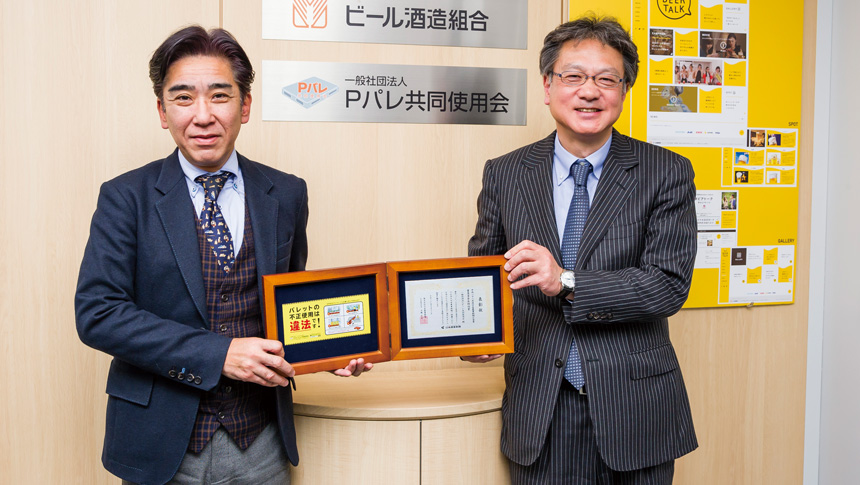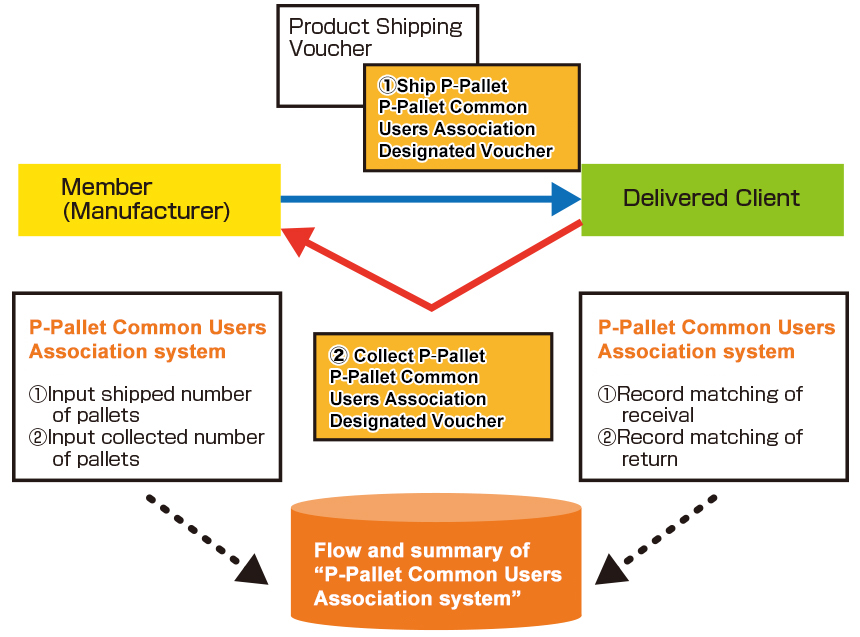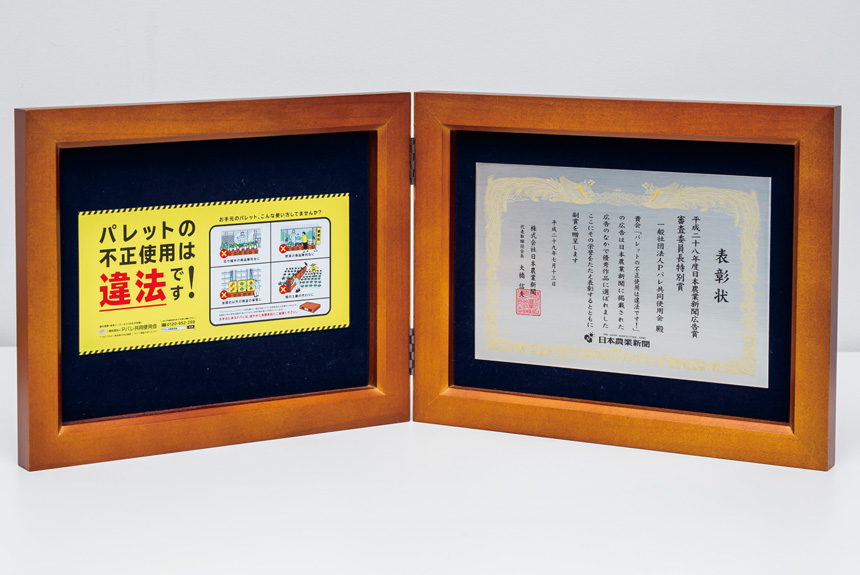General Incorporated Association P-Pallet Common Users Association
Using standardized vouchers and a management system to visualize distribution to prevent unauthorized use and loss of P-Pallets
*Company names and product names in this article are registered trademarks or trademarks of each company.
A general incorporated association, P-Pallet Common Users Association consists of 106 major Japanese beer, sake and shochu manufacturers.
In addition to promoting the shared use of type 9 plastic pallets (900 x 1,100 mm) (hereinafter referred to as P-Pallets) that are used when shipping alcoholic beverages, etc., we are engaged in activities to prevent unauthorized use and outflow. We asked Mr. Shuji Takimoto, Representative Director, and Mr. Tomohiko Shimada, Managing Director of the association, about the current status of pallet management, ways to improve the collection rate and future challenges.

From left: Mr. Tomohiko Shimada, Managing Director
Mr. Shuji Takimoto, Representative Director,
General Incorporated Association P-Pallet Common Users Association
Established to strengthen management and promote the use of P-Pallets
P-Pallet Common Users Association was established in March 2013 and is celebrating its fifth anniversary. Its predecessor was a group of four major breweries, which were organized to promote proper management and joint use of P-Pallets.
A P-Pallet is designed with a size of 900 x 1,100 mm and is mainly used for the transportation and storage of alcoholic beverages. Previously, each manufacturer had to deliver and collect products using their own pallets. Therefore, their clients needed to sort and store the P-Pallet for each manufacturer, and the manufacturers had a problem taking time to sort the pallets when they collected them. That’s why the brewing industry came together to promote joint use, unsorted collection of P-Pallets and to manage the flow of P-Pallets as a whole.
Mr. Takimoto explained why the association became a general incorporated association, "Because we believe that a general incorporated association will increase social credibility and make it easier to carry out educational activities regarding unauthorized use and loss of P-Pallets." Their goal is 100% collection rate, focusing on low pallet collection rate areas to achieve it.
Visualizing the distribution of P-Pallet with a common system and vouchers
The pallet collection rate improved to 99.6% in 2013 as a result of being incorporated and the word spreading, but it was 99.31% in the following year. The number of uncollected pallets was about 300,000 in 2014, and more than 200,000 pallets have been uncollected every single year since then.
"If the collection rate is 99.3%, you may think that the uncollected amount is 0.7%, which is small. However, since there are 44 million shipped pallets per year, 0.7% of those means over 300,000 pallets are lost. We lost billions of yen, and it’s not a small number," says Mr. Takimoto.
They introduced the "P-Pallet Common Users Association system" to realize common management in June 2014. This was originally developed by JPR based on their pallet management system know-how. They simultaneously unified the various management vouchers to a P-Pallet Common Users Association designated voucher. Mr. Takimoto explains the impact and the aim of adopting them as follows.

Flow and summary of "P-Pallet Common Users Association system"
"By having the member companies, the clients in delivery destinations and shipping companies input the P-Pallet shipment/collection data into the system, it allowed us to collectively understand the number of shipments and the number of collected pallets for each member company. We aimed to visualize the actual distribution of P-Pallets, which enabled us to take concrete measures such as strengthening the collection operations by identifying areas with low collection rates. Regarding the collection of the outflowed pallets, we mainly ask JPR for research and collection. JPR collected about 20,000 pallets in 2017."
They unified the printed mark on P-Pallets, which was different across companies, clearly stating, "Transfer/Unauthorized use is completely prohibited. Under management by P-Pallet Common Users Association." The aim is to clearly show the ownership of P-Pallets and raise awareness to return.
Received Judge's Special Award for unauthorized use prevention advertisement
With the introduction of the "P-Pallet Common Users Association system," the distribution of pallets could be visualized and management progressed, but the problem of uncollected items because of illegal use or loss still remains in seeking for a solution.
"I don't think the society hasn’t appreciated the value of P-Pallets. The cost of purchasing extras every single year is enormous, and we cannot deliver the products to consumers without P-Pallets. Pallets are the main artery of logistics," says Mr. Takimoto.
A JPR survey found that lost P-Pallets are often found in fruit and vegetable markets where P-Pallets aren’t originally distributed. So, they have gone to a meeting where relevant ministries and market officials gathered to appeal their activities and requested for cooperation to collect lost pallets.
In addition, they are also producing educational advertisements to change awareness of unauthorized use and unreturned P-Pallets. For example, Mr. Shimada says that he is making plans for continuous publication in specialized magazines for market participants.

In 2017, the Japan Agricultural Newspaper awarded P-Pallet Common Users Association the "Judge Chairman's Special Award."
The Japan Agricultural Newspaper Advertising Award was established in 2004 and has been awarding to advertisers with excellent content and design among the advertisements published in the newspaper.
"The content of the advertisement is a concrete representation of the illegal use, so people will be aware of it."
These efforts were well received, and the Japan Agricultural News awarded P-Pallet Common Users Association the "Special Award for the Chairman of the Jury" in 2017. Mr. Shimada says that it was a great encouragement that their daily tiresome activities were noticed.
For the first time last year, we received information about unauthorized loss from the public
With these awareness-raising activities, there were 10 cases of information provided by anonymous individuals regarding unauthorized use for the first time in 2017.
"We have posted contact information on our website and advertisements so that we can get information by phone or email for unauthorized use, and finally the general public contacted us last year. It is only 10 cases, but I was very pleased that the results of our activities had an effect. It is the effect with both increased compliance and awareness-raising activities," rejoices Mr. Shimada.
In malicious cases where pallets are held illegally and not responding to requests to return, they may take legal measures after consulting with a legal counsel.
Easy-to-use management system to eliminate unknown pallets
With the introduction of the JPR's system, it became possible to clearly trace P-Pallets through the regular distribution route, but in order to achieve 100% collection, prevention of the outflow has remained for both current and future issues.
For example, it may be lost by unauthorized removal from the distribution network even though it can be logged by the system.
In order to prevent this, it is indispensable that the person in charge at each shipping and receiving site inputs the data into the system correctly. Actually, although there are differences with various distribution forms, it is necessary to optimize it for data input.
"Every company has a big problem of labor shortage, so it is the current situation that it is not possible to use so much time for data input. In order for the member companies, our clients and shipping companies to use it smoothly, I would like to improve the system consulting with JPR. Member companies have also given various ideas such as using it for inventory management of pallets as well. In the future, a management method that uses such IC tags may be necessary. In any case, I would like to build a better management system by taking advantage of JPR's rich experience and knowledge." says Mr. Shimada.
Aiming for 100% collection rate while attention is focusing on logistics issues
On the other hand, while the severe situation of courier companies has been a social issue, I feel that not only the top of the company but also the whole society is paying attention to the problem of logistics, says Mr. Takimoto.
"Awareness of logistics has changed, both in terms of the environment and corporate management. For example, four major breweries have started joint delivery in the eastern part of Hokkaido since last year, and new efforts are being made in terms of logistics. The company side is fully aware that the additional purchase cost of the pallets may put pressure on corporate management and solving those problems is an important survival strategy. We would like to continue being more active."

